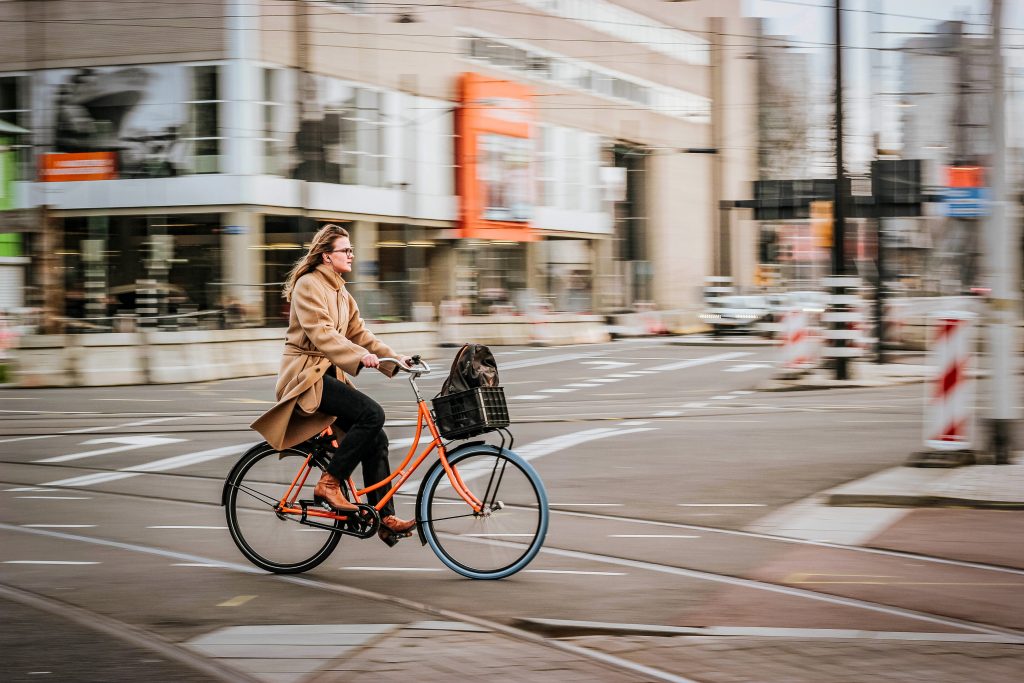To tailor BMW’s catchphrase, Isabell Eberlein is the ultimate cycling machine. Her track-record of cycling advocacy is staggering – from Berlin’s bicycle referendum, to cycle rides against the patriarchy, to making businesses bike-friendly. She told us about what drives her and how she campaigns for change.
Isabell’s Story: Not the People’s Car, but the People’s Bicycle
Riding a bicycle to her Grandma’s aged seven and growing up watching her father’s organic farming in Germany, Isabell has always been conscious of the changing climate. But it was not until she studied in Amsterdam, as part of her Environmental Governance Masters, that she became captivated by cycling.
“In the Netherlands, everyone cycles. I saw people with all kinds of different bodies shapes, ages and ethnicity cycling; it didn’t matter what party you voted for or what job you had,” Isabell explains. “It’s not like this in Germany. Only a specific type of people cycle. We are the car country of the world – our cities and entire systems are built for the car.”
Taking part in critical mass cycle rides was particularly significant. “It’s such an amazing feeling. You’re part of a movement, literally because you are also moving your body; it’s really empowering,” she says. “That made me see the bicycle as a vehicle for change.”
Since then, Isabell has put her all into campaigning for inclusive cycling in Germany. She fought for Berlin’s bicycle referendum in 2018, collecting signatures to push for bike-friendly legislation, and currently volunteers with the bicycle-friendly network Friedrichshain-Kreuzberg and Changing Cities. She’s pushed women’s rights in cycling, orchestrating Purple Ride demonstrations and Women in Cycling, and pushed innovation in cycling, launching the start-ups naturtrip.org and BICICLI. She is also transforming businesses to be more bike-friendly, as CEO of Velokonzept and mobility consultant at OKAPI.

With such a list of achievements, it’s fair to say that Isabell really is the bike’s biggest ally. We talked to her about each area of advocacy and have summarised them below.
Bicycles & Feminism: The Power of Body-Machine-Interaction
Addressing the gender cycling gap is close to Isabell’s heart. One of the reasons that women cycle less, she argues, is because their voices are not heard by mobility planners.
Drawing on the book ‘Invisible Women’ by Criado-Perez, Isabell describes how the world is by default built for men. “City design is set up for the commuting male who goes to work and comes back to the home,” she explains. “But the person who takes care of children or elderly has a different kind of commute – a mobility of care. And a lot of the time, it’s women.”
By not being part of the design process, the needs of women are not thought about or included. The fact that women are more risk-averse, so rely upon safe cycling infrastructure to cycle, is overlooked when female voices are not consulted.

Intent on changing this, Isabell created a network called ‘Women in Cycling’ to bring together female cycling advocates and the public sector. Launched at the beginning of 2021, it is hoped that the bicycle can be seen as a symbol of female strength.
“On the bike, you put in your own power and use your own muscles. You have this body-machine-interaction: it empowers yourself,” Isabell says. “When women take space and take action, then it can also empower society.”
Bicycles & Business: Fuel Allowances … or Folding Bikes?
As the CEO of Velokonzept, another area that Isabell focuses on is encouraging businesses to be bike-friendly. Offices which have lockers, showers, bike stands and bike-to-work schemes are of course beneficial, but she points out that what’s really needed is a “shift in company culture”.
Companies cars or fuel allowances are examples of corporate car-dependency. “We have to get rid of the status that cars seem to have,” explains Isabell. Instead, she suggests having folding bikes available for business trips, mobility allowance for public transport or a company cargo bikes.
“It’s important that companies understand what they can do with bicycles,” she states. Bikes can be branded to advertise the company, whilst also creating a positive image for recruitment and fulfilling corporate social responsibility commitments. Investing in cycling measures now allows prepares businesses for the future, as legal regulations requiring sustainable commuting transport are likely to increase as Germany pushes towards carbon neutrality.
One of Isabell’s proudest projects began with the company’s head stating, “I have to tell you something: I hate cyclists.” Undeterred, she implemented a state-of-art bicycle park, equipped with automatic moving doors and showers for 5,000 employees, along with other measures. By completion, his loathe of bicycles had swayed. “He understood that things needed to change,” she says.
Another industry Isabell has her sights set on is the bike industry. “The bicycle is a C02 friendly mode of transport, but it’s not a C02 friendly-product,” she states. Made of hundreds of parts with a vast global production chain, the bicycle itself cannot be heralded as a green machine – let alone the battery of an e-bike.
With a group of experts, Isabell is working on raising awareness of eco-friendly production and increased transparency of supply chains. “There’s a huge gap to be filled,” she states, “the bike industry has the chance to transform itself.”

Bicycles & Administration: Why a New Mindset Is Needed
Something Isabell has been frustrated by is the lack of progress made by public administrations in implementing cycling measures. Despite Germany’s Mobility Bill being passed three years ago, Berlin has made little progress.
“If you study planning in Germany, it is 99% planning streets for cars. There’s a huge lack of knowledge and jobs,” Isabell explains. “There’s this mindset in administration where they find an argument for why it’s not possible, instead of making it possible.”
Fresh thinking, inspiring personalities that push for change and greater collaboration are needed to really make things happen, she argues. Part of Isabell’s work with OKAPI tackles exactly that, by channelling innovations between industry and administration. She points to the example in Malmö, where data collected by the airbag helmet app is shared with the city to identify the dangerous spots.
By building these connections, Isabell hopes that it can revive administrations and enhance cycling solutions.
Isabell’s Advice for CityChangers
For those trying to improve cycling in their city, Isabell had this advice. “First of all, check what your city’s already doing. Often the ideas are all there, but the problem is the implementation”.
“Then you should find people you can do this with, because you cannot do it alone. With allies, you can then define your strategy” she says. “Make sure you find a way to talk to your city’s administration – it’s the implementation of things that really matters.”
In a Nutshell…
Whatever the issue – whether it’s the lack of women cycling, the lack of bike-friendly business, or the lack of pro-bike administrations – Isabell has offered a solution. With Isabell in the driving seat, it’s hoped Germany’s car culture will start to make a U-turn.



[…] einsetzt, kann selbst aktiv werden. Ob in einem Wohnraumprojekt, einem Gemeinschaftsgarten, als Fahrradaktivistin oder in der lokalen Kulturszene – die Stadt gehört ihren Menschen und sollte sich an deren […]